Going Postal Blu-ray Movie
HomeGoing Postal Blu-ray Movie 
Acorn Media | 2010 | 183 min | Not rated | Sep 20, 2011
Movie rating
7.3 | / 10 |
Blu-ray rating
| Users | 0.0 | |
| Reviewer | 4.0 | |
| Overall | 4.0 |
Overview
Going Postal (2010)
In the fantasy world of Ankh Morpork, a con man named Moist von Lipwig is sentenced to death, but Lord Vetinari offers him a choice: he can walk out of the door (and fall to his death) or become Postmaster of the city's rundown Post Office. Lipwig chooses the latter and enters a world of eccentrics, mysteries and deadly conspiracies.
Starring: Richard Coyle, Claire Foy, David Suchet, Andrew Sachs, Charles DanceDirector: Jon Jones (II)
| Fantasy | Uncertain |
| Comedy | Uncertain |
Specifications
Video
Video codec: MPEG-4 AVC
Video resolution: 1080i
Aspect ratio: 1.78:1
Original aspect ratio: 1.78:1
Audio
English: LPCM 2.0
Subtitles
English
Discs
50GB Blu-ray Disc
Single disc (1 BD)
Packaging
Slipcover in original pressing
Playback
Region A (B, C untested)
Review
Rating summary
| Movie | 4.5 | |
| Video | 4.5 | |
| Audio | 3.5 | |
| Extras | 4.0 | |
| Overall | 4.0 |
Going Postal Blu-ray Movie Review
Once Upon a Time, There Were These Things Called "Letters"
Reviewed by Michael Reuben March 31, 2012Although I'm a newcomer to the alternate reality of Terry Pratchett's "Discworld" novels, after watching this British TV adaptation of one the most popular, I understand their attraction. Pratchett shares the essential knack of all great fantasy writers (including Tolkien and Rowling) for imagining another world in such vivid detail that it breathes with independent life. Like all the best writers of the fantastic, Pratchett borrows creatively from things we recognize (and quite a few things we don't), and his sources come from whatever strikes his fancy. Fairy tales, folk mythology, Jewish mysticism, vampire legends, modern technology, old technology, heavy leather, Freudian theory—all of these (and more) contribute their bit to the world of Going Postal. Somehow it all fits. Only Pratchett knows the secret. Going Postal is the third TV adaptation of Pratchett's novels, and I suspect its attraction as a video release is that it doesn't require that one know much background about "Discworld", which is a huge flat surface balanced on the backs of four elephants who stand on the shell of a giant turtle swimming through space. None of this cosmology is important in Going Postal, most of which takes place within Discworld's city of Ankh-Morpork, but think of it as a quick introduction to the Pratchett universe. The Post Office in Pratchett's tale is composed of familiar elements, but it resembles no post office anyone on either side of the Atlantic has ever seen. The same goes for the Post Office's competitor, known as "the Clacks", a kind of hybrid of telegraph, telephone, semaphore and email, about which Pratchett obviously has his doubts. But more on that later. Going Postal was shown in two parts on Britain's Sky1 network on May 30, 2010. As far as I can tell, it never aired in the United States.
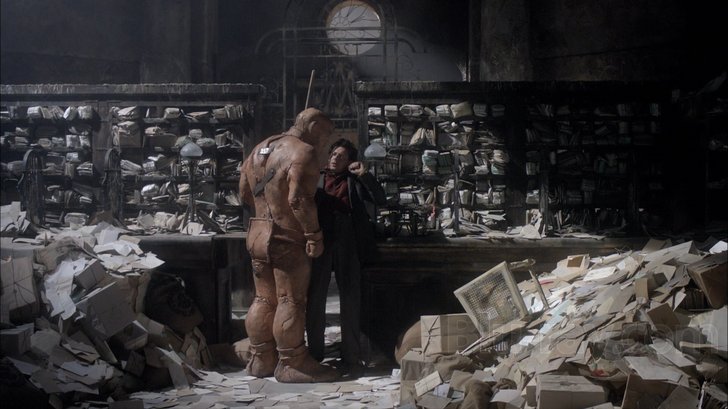
The story begins with Moist Von Lipwig (Richard Coyle), a natural born con artist with a winning smile, who pulls off scam after scam with utter sang-froid—until he's caught and sentenced to death by hanging. His executioner, Trooper (Daniel Cerqueira), is a cheerful fellow straight out of a Monty Python sketch, but no one is more surprised than Lipwig when, after dropping through the hangman's trap door, he wakes up in the offices of the ruler of Ankh-Morpork, the stern Lord Vetinari (Charles Dance). He has an offer Lipwig can't refuse. Lord Vetinari wants Lipwig to become the new Postmaster and reopen the city's Post Office. If he accepts, he'll be given a second chance. If he refuses, he can exit by the side door of Vetinari's office into a bottomless pit that looks like something from an early Terry Gilliam film. (Indeed, much of the production design of Going Postal appears to have been inspired by Gilliam.) Lipwig accepts the inevitable and takes the job. He thereby enters a game much bigger than any he's ever played before. The reason for the Post Office's woes is the alternate system of communication called "the Clacks". In Pratchett's introduction, he describes the Clacks as what the internet might look like if you had to create it without electricity, using strictly mechanical elements such as string, paper tape, pulleys and similar Rube Goldberg elements. Messages are relayed through a series of signal towers, and when the system works, it's fast and efficient. But it's also expensive. The owner of the Clacks system, Reacher Gilt, sees to that. He's played by David Suchet, who is clearly having a wonderful time acting the villain and hiding behind an eye patch and a wig of sweeping black hair that renders him unrecognizable as the famous face of Hercule Poirot. (In Pratchett's book, Gilt was modeled on a pirate and had a parrot on his shoulder, but director Jon Jones decided that including a live animal in every scene with Gilt would be impractical.) Like a greedy ISP or cell service provider, Gilt is always raising the price of Clacks service, and he's free to do so now that the Post Office is out of business—a development, it turns out, that Gilt has not achieved by honest competition. News that Lord Vetinari has hired a Postmaster does not brighten Gilt's mood. Before reporting to the Post Office, Lipwig tries to escape, but he finds he's been assigned a parole officer: a massive golem named Mr. Pump (Marnix Van Den Broeke, who is 6' 7", inhabits the suit; Nicholas Farrell supplies the commanding voice). Pump is unstoppable and inescapable, but he and Lipwig develop an intriguing friendship by the end of Going Postal. Resigned to his fate, Lipwig enters the derelict building, where he's greeted by unruly piles of undelivered mail, extending as far as the eye can see in all directions, like some nightmare vision of a Dead Letter Office. (Indeed, Lipwig will shortly begin experiencing just such nightmares.) He has a staff of just two. The first is Stanley Howler (Ian Bonar), who's eager, green and obsessed with collecting . . . pins? (Yes, pins.) The other is an old-timer named Groat, who knows and reveres all of the institution's rules and regulations; Groat is played by Andrew Sachs, who is a living legend in the world of English comedy, because almost forty years ago he created one of the funniest characters ever to appear on any TV screen: Fawlty Towers' Spanish waiter, Manuel. It's from Groat that Lipwig learns about the previous four Postmasters, all of whom died suspiciously violent deaths. As he begins to grasp the magnitude of his dangerous situation, Lipwig realizes that he has to start applying his slippery talents to resuscitating the Post Office and making it a going concern. Escape is certainly impossible, as Lipwig confirms by visting the Golem Trust, which controls Pump and all the other golems. The Trust is run by Adora Belle Dearheart (Claire Foy of Little Dorrit), a severe and waspish creature who puts the "no" in "no nonsense". Precisely because Adora Belle can't stand a man of Lipwig's character, he falls for her instantly. And as it happens, their interests are aligned. Adora Belle despises Reacher Gilt, who effectively stole the Clacks system from her father, its inventor. Adora Belle recently lost her brother, John (Tamás Mohai), in a Clacks accident that she believes was arranged (it's the opening sequence of episode 1), and she'd be thrilled to see the Post Office knock Gilt off his perch—if Lipwig is the man for the job, which Adora Belle very much doubts. Around this already rather complicated plot, Pratchett and the two script adapters, Richard Curti and Bev Doyle, have embroidered elaborate and diverting subplots that always manage to wind their way back to the main story. Displaying a good con man's attention to people's soft spots, Lipwig becomes a quick study on pin collecting and postal regulations to motivate his new staff, and he applies his forger's talent to the invention of stamps, which quickly become the hot new thing in mail delivery. (He also invents what looks like the Pony Express, to which Gilt responds with something that closely resembles a stagecoach robbery.) All the while, Lipwig and Gilt battle for the favor of the press, as personified by Miss Cripslock (Tamsin Greig). There are ghosts in the Post Office, reckonings with Lipwig's past, a buried fortune, vampire assassins, a deadly fire and a radical hacker group dedicated to disrupting the Clacks. (And more. Pratchett's world is nothing if not overstuffed.) Director Jon Jones (one of the directors of Zen) took his cast and crew to Budapest, Hungary, where some of the most bizarre-looking sets were found among existing ruins instead of being built. Even though it was made on a television budget, Going Postal looks like it cost a lot more, because its makers really did go to a foreign land to create another world. It's like nothing you've seen before.
Going Postal Blu-ray Movie, Video Quality 
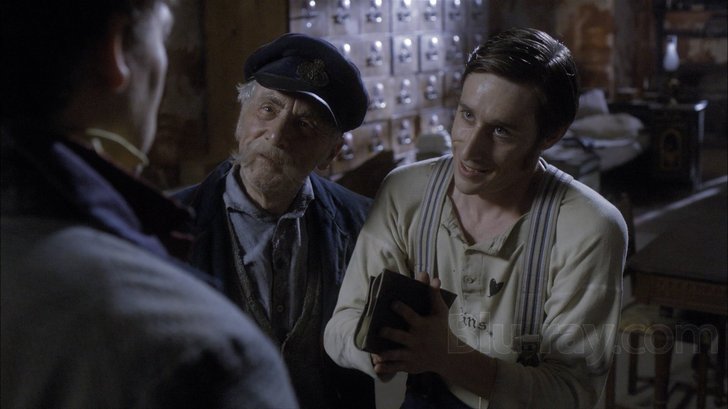
Going Postal was shot on hi-def video by Gavin Finney, who has extensive credits for British TV, including the previous adaptation of a Terry Pratchett novel, Hogfather. Although director Jones waxes nostalgic on his commentary for the textures of film, he also notes Finney's ability to adapt the digital medium to mimic film's capabilities, and the presentation on Acorn Media's 1080i, AVC-encoded Blu-ray, sourced from a digital intermediate, showcases Finney's work to great effect. Clear and sharp, with excellent detail throughout, the image also conveys the noir-ish sense of a risky world where danger always lurks in the shadows (along with the dust). The color scheme of Going Postal tends toward the muted and desaturated, with the occasional flash of something bright to remind you that there really is color in this world, when the light has a chance to penetrate. Blacks are deep and solid, which is essential for a tale in which key characters (notably Adora Belle and Lord Vetinari) are attired all in black. The use of a BD-50 has prevented any compression artifacts, and the purely digital path from acquisition to disc eliminates such issues as grain reduction or artificial sharpening.
Going Postal Blu-ray Movie, Audio Quality 
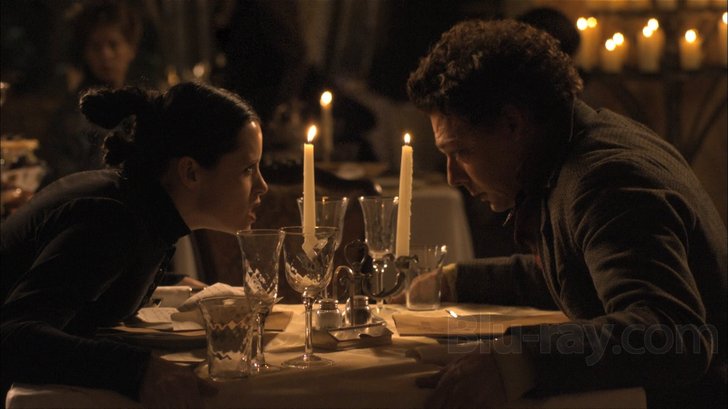
The PCM 2.0 has a robust presence and dynamic range, especially when played through a surround decoding system such as DPL IIx. Dialogue is clear and centered, sound effects are distinctive and often quite funny, and the aggressively cheerful musical score by John Lunn (currently best known for scoring Downton Abbey) keeps everyone reminded that, no matter how dire Moist Von Lipwig's situation may seem, everything in Discworld should be taken with tongue firmly in cheek.
Going Postal Blu-ray Movie, Special Features and Extras 
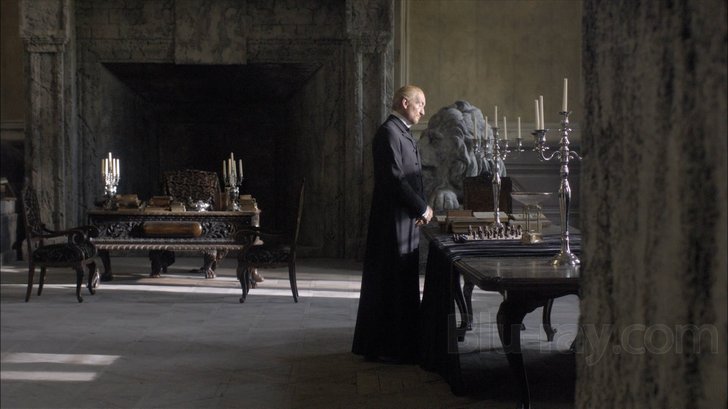
- Introduction by Terry Pratchett (HD, 1080p; 1.78:1; 4:44): Optionally playable before part 1, Pratchett's introduction conveys his delight in participating in the filming of Going Postal, which, as he describes it, consists of hanging out on the set in Hungary and marveling at the work of all the artists and craftspeople involved. (The director's commentary and interviews with various cast and crew suggest that he did much more.)
- Commentary with Director Jon Jones: Jones speaks continuously, almost breathlessly, and he covers almost every aspect of the production: casting, production design, lighting challenges (which were substantial), costumes, acting styles, horsemanship, the intense heat of the Hungarian summer in which Going Postal was filmed, locations, practical effects vs. CG, and aspects of the novel they chose to omit.
- Picture-in-Picture Commentary with Director Jon Jones: Now here's an odd feature. It's the exact same commentary as above, except that it plays with Jones looking out at you from a small window in the screen (and routinely glancing over at a monitor on which Going Postal is playing). One advantage of this arrangement, I suppose, is that the presence of a camera prevents a commentator from falling into the dangerous habit of going silent while watching the film, but why any viewer would select this option is beyond me.
- Interviews (SD; 1.78:1, enhanced; 51:35): All of these are worth watching. Of particular note are the comments on the concepts for costume and make-up (essentially, late Victorian era with a few twists) and the excitement of long-time Pratchett fans who were selected to appear as extras in scenes on the streets of Ankh-Morpork and found themselves rubbing shoulders with Hercule Poirot, Manuel and other legends, all of whom were asking them how it was going.
- Terry Pratchett
- Directory and Producer
- Costumes
- Make-Up
- The Fans
- The Cast
- Steve Pemberton
- Richard Coyle
- David Suchet
- Claire Foy
- Charles Dance
- Andrew Sachs
- Ian Bonar
- Madhav Sharma
- Timothy West
- Deleted Scenes (SD; 1.78:1, enhanced; 6:26):
- Dave Pins (Longer Version): A slightly extended scene of Lipwig's hilarious visit to the shop run by Dave (Paul Barber), whose tattoo reads "Death Or Pins" and who insists on standards ("I don't do nails. We get kids here!").
- Princess and Rogers Clacks Towers: Gilt conducts a labor negotiation.
- Lipwig Bribes Mr. Spools: An additional scene between Lipwig and his stamp printer.
- Gilt and Horsefry, Snake Sheds His Skin: An additional scene between Gilt and his right-hand man (played by Madhav Sharma).
- Coach Has Been Attacked: A short insert.
- Lipwig Finds Out About Lodgers: A conversation between Lipwig and Groat that won't make any sense until after you've seen episode 2.
- Image Galleries (HD, 1080p; various)
- Storyboards (4:40)
- Props (1:50)
- Set Drawings (0:30)
- Bloopers (SD; 1.78:1, enhanced; 3:54): Director Jones refers to some of these in his commentary. As is often the case, props can be uncooperative.
- Additional Trailers: At startup, the disc plays trailers for Acorn Media, Murder on the Orient Express and Bonekickers. These can be skipped with the chapter forward button and are not otherwise available once the disc loads.
Going Postal Blu-ray Movie, Overall Score and Recommendation 
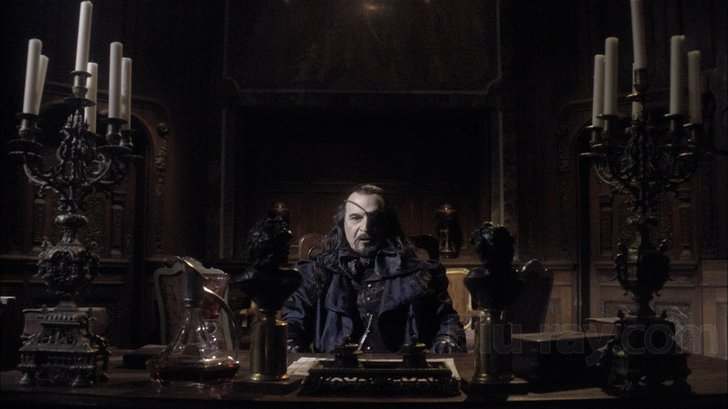
On the strength of Going Postal, one can only hope that Acorn Media is able to obtain the rights to the two previous Terry Pratchett adaptations and to future ones that are rumored to be in development. It's a superb entertainment that has obviously been made with care and devotion to the source. Highly recommended, even if, as I was, you're a complete stranger to Discworld.
Similar titles
Similar titles you might also like

The Colour of Magic
2008

Hogfather
2006

The Brothers Grimm
2005

His Dark Materials: The Complete Third Season
2022

Jack the Giant Slayer
2013

Dolittle 4K
2020

Merlin and the War of the Dragons
2008

Pan
2015

Fantastic Beasts and Where to Find Them 4K
2016

Fantastic Beasts: The Crimes of Grindelwald 4K
2018

Maleficent: Mistress of Evil
2019

DragonHeart 4K
1996

Dragonheart: Vengeance
2019

Willow 4K
1988

Atlantis: Season Two Part Two
2015

Gulliver's Travels
2010

The Chronicles of Narnia: The Voyage of the Dawn Treader
Explorer Pack / Postcards Booklet
2010

Dragonheart: Battle for the Heartfire
Dragonheart 4
2017

Dragonquest
2009

Tin Man
2007